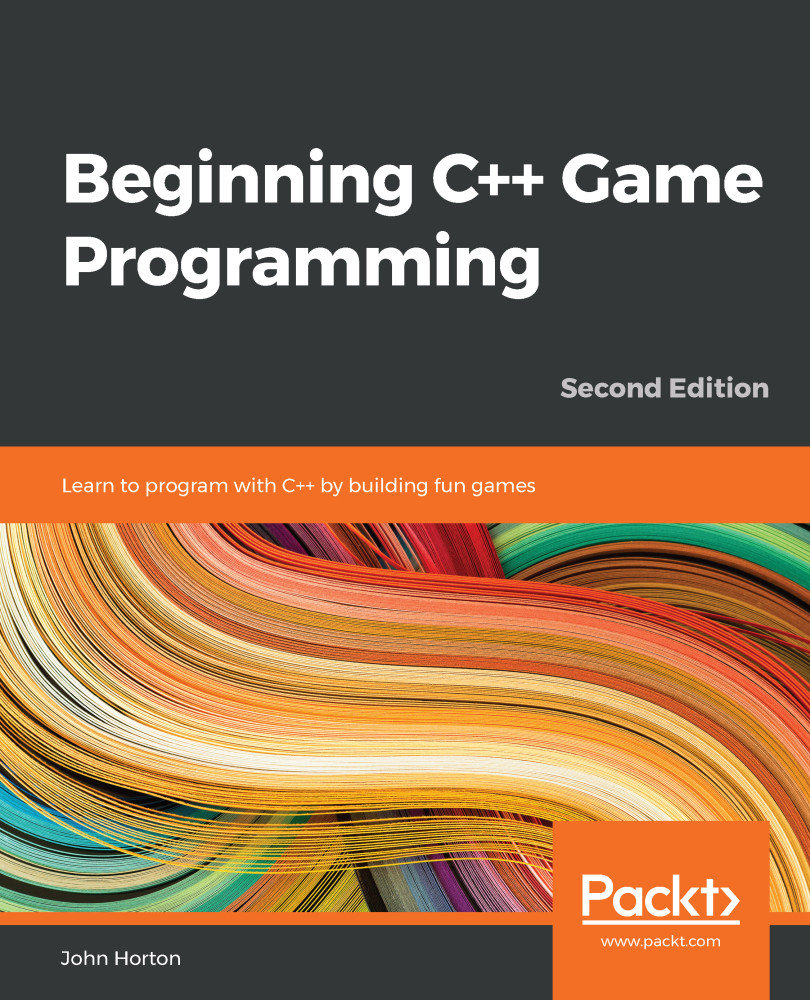-
Book Overview & Buying

-
Table Of Contents

Beginning C++ Game Programming - Second Edition
By :

Beginning C++ Game Programming
By:
Overview of this book
The second edition of Beginning C++ Game Programming is updated and improved to include the latest features of Visual Studio 2019, SFML, and modern C++ programming techniques. With this book, you’ll get a fun introduction to game programming by building five fully playable games of increasing complexity. You’ll learn to build clones of popular games such as Timberman, Pong, a Zombie survival shooter, a coop puzzle platformer and Space Invaders.
The book starts by covering the basics of programming. You’ll study key C++ topics, such as object-oriented programming (OOP) and C++ pointers, and get acquainted with the Standard Template Library (STL). The book helps you learn about collision detection techniques and game physics by building a Pong game. As you build games, you’ll also learn exciting game programming concepts such as particle effects, directional sound (spatialization), OpenGL programmable shaders, spawning objects, and much more. Finally, you’ll explore game design patterns to enhance your C++ game programming skills.
By the end of the book, you’ll have gained the knowledge you need to build your own games with exciting features from scratch.
Table of Contents (25 chapters)
Preface
 Free Chapter
Free Chapter
Chapter 1: C++, SFML, Visual Studio, and Starting the First Game
Chapter 2: Variables, Operators, and Decisions – Animating Sprites
Chapter 3: C++ Strings and SFML Time – Player Input and HUD
Chapter 4: Loops, Arrays, Switches, Enumerations, and Functions – Implementing Game Mechanics
Chapter 5: Collisions, Sound, and End Conditions – Making the Game Playable
Chapter 6: Object-Oriented Programming – Starting the Pong Game
Chapter 7: Dynamic Collision Detection and Physics – Finishing the Pong Game
Chapter 8: SFML Views – Starting the Zombie Shooter Game
Chapter 9: C++ References, Sprite Sheets, and Vertex Arrays
Chapter 10: Pointers, the Standard Template Library, and Texture Management
Chapter 11: Collision Detection, Pickups, and Bullets
Chapter 12: Layering Views and Implementing the HUD
Chapter 13: Sound Effects, File I/O, and Finishing the Game
Chapter 14: Abstraction and Code Management – Making Better Use of OOP
Chapter 15: Advanced OOP – Inheritance and Polymorphism
Chapter 16: Building Playable Levels and Collision Detection
Chapter 17: Sound Spatialization and the HUD
Chapter 18: Particle Systems and Shaders
Chapter 19: Game Programming Design Patterns – Starting the Space Invaders ++ Game
Chapter 20: Game Objects and Components
Chapter 21: File I/O and the Game Object Factory
Chapter 22: Using Game Objects and Building a Game
Chapter 23: Before You Go...
Other Books You May Enjoy
